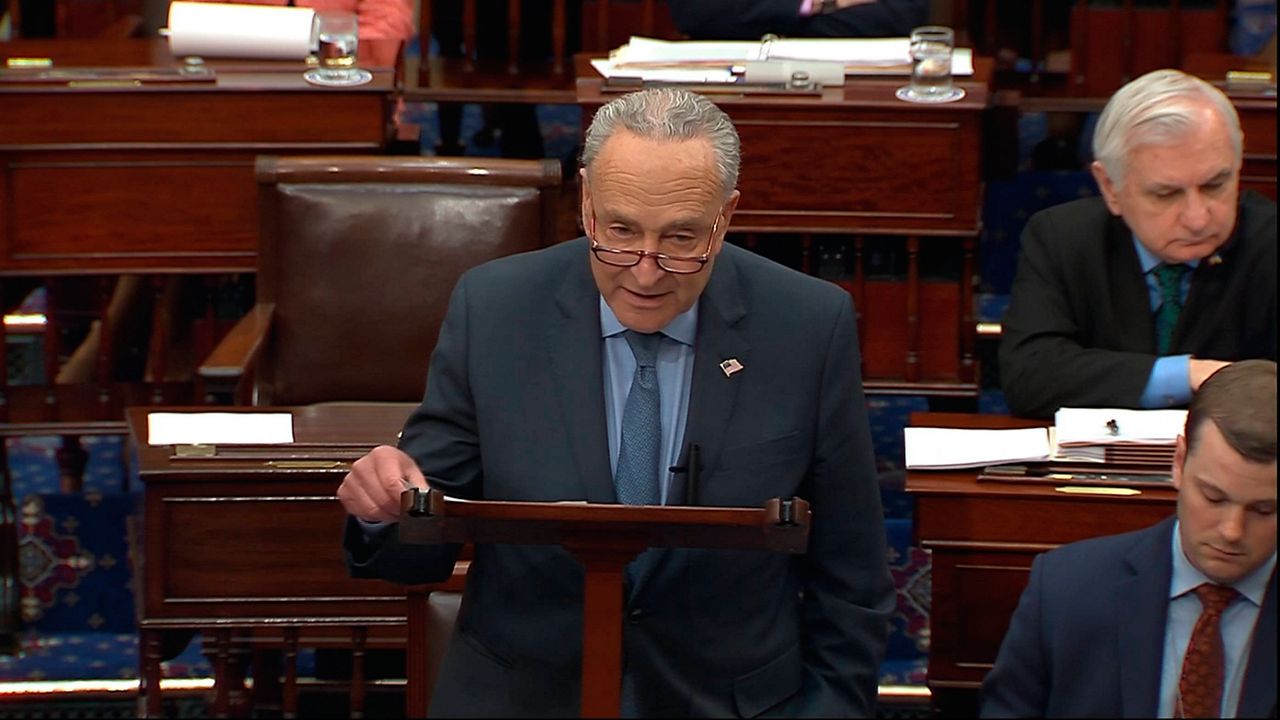Rep. Katie Porter has made no secret of her disdain for earmarks, the practice of placing targeted provisions into spending bills for specific projects.
In a video posted to social media this week, Porter brought her opposition to earmarks to her campaign to represent California in the U.S. Senate, suggesting that politicians engaging in the process are participating in a system with a legacy of graft.
Her Senate campaign opponents, Reps. Adam Schiff and Barbara Lee, fellow Congressional Democrats from California, fired back at her comments, accusing her of ignoring constituent needs to gain political points.
Earmarks were effectively killed in 2011, when then-President Barack Obama promised to veto any bill passed by Congress that arrived replete with earmarks. His criticism fell in line with Republicans, who sought to ban the practice to lower federal spending. But a decade later, lawmakers on both sides of the aisle revived the practice to try and close deals on infrastructure and other spending measures.
“This pet project funding was actually banned in 2011 because — shocker — it led to a lot of corruption,” Porter said in a video posted to social media on July 25. “Instead of neutral experts looking at where the need is greatest, politicians up for reelection set taxpayer dollars aside for projects they choose for their own reasons.”
Porter previously attacked the use of earmarks in 2021, when they were brought back under new names: Community Project Funding in the House, Congressionally Directed Spending in the Senate. In a Wall Street Journal op-ed, Porter decried its revival as “a system with a history of corruption and backroom deals that waste tax dollars” that “invites waste, fraud and abuse.”
“The solution to Washington gridlock isn’t misdirected spending; it’s an end to the dark money that encourages politicians to listen to donors rather than the people we represent,” she wrote.
When the system was reintroduced in 2021, so-called guardrails were set in place, intended to protect against abuse of the system. Though the rules differ by chamber — and then, further, by the committee under whose purview the request falls under — the details of each request made by members of both the House and the Senate is placed online, available for public review. Members are also required to certify that neither they nor their spouse has financial interest in such an earmark.
According to an analysis by RollCall, Republican lawmakers have $7.4 billion in approved earmarks among more than 4,700 projects, in appropriations bills for the upcoming fiscal year. Democrats received $2.8 billion in project earmarks.
When asked by Spectrum News, Schiff said that he hadn’t seen Porter’s video, but was proud of bringing federal tax dollars back to his district “to help homeless people find shelter, to help provide mental health services, to help establish a regional DNA lab to help solve unsolved crimes,” which he said were “important community-based initiatives.”
“Some members would rather have a political talking point than help their constituents,” Schiff said Thursday. “But I’ll tell you, my constituents, they would rather have housing than a political talking point.”
According to data published by the House Appropriations Committee, Schiff requested $22.9 million in earmarks over 15 projects in Fiscal Year 2024, including expansion of mental health services in Burbank, improvements to permanent supportive housing, shelter expansions, development of tiny home villages and modular housing, wildfire fuel reduction and community college health sciences apprenticeship program.
Lee requested $35.9 million which includes modernizing the USDA’s Western Regional Research Center, cyber security public safety enhancements for the City of Oakland, a community college community policing training program, permanent supportive housing, economic development projects and infrastructure improvement for parks.
Roll Call reported that Lee and Schiff got $15.9 million and $12.3 million respectively from their requests.
“I am not going to neglect my constituents,” Lee said. “These projects create jobs, they providing standing in the gap for services for so many people who are living on the edge…in a state such as California, when you have 20 million people living one paycheck away from poverty, I am not going to neglect my constituents, nor the state, by not bringing in as many federal projects — these are tax dollars. My constituents in the state deserve their tax dollars to be returned to the state.”
Porter did not make any requests for project funding. Though her website’s appropriations request page is currently blank, a cached version includes links to a now-closed Google Form.
Spectrum News reached out to both Porter’s campaign and her congressional office, asking how many applications for community project funding her office received, but has not yet received a responsive figure.
When asked for comment on her video and whether she was implying her opponents were corrupt for participating, a representative for Porter said that the congresswoman “fundamentally believes we need to restore Americans' trust in government and that ending earmarks once and for all is an important part of that.”
An elected official in Porter’s district, speaking on condition of anonymity, told Spectrum News that they haven’t observed any problems with Porter’s stance, saying that “our state representatives are good at directing money to us” for projects.
But Schiff appeared to criticize Porter without mentioning the Orange County congresswoman by name.
“Any candidate for the Senate that says I won't do that, well, Californians are going to lose,” Schiff said.
“But you know who's going to be thrilled with that kind of political talking point? The senators from every other state in the union,” he added, suggesting that other lawmakers will happily take funding for their state instead.
One California Democratic staffer, speaking anonymously, told Spectrum News that “many of her constituents and [organizations] ask other offices to get them money because she won’t — and it’s sad to see.”
“That’s millions of dollars being left on the cutting room floor that could change so many lives, so it’s definitely a lost opportunity, in the eyes of every member, across the country,” they added.









